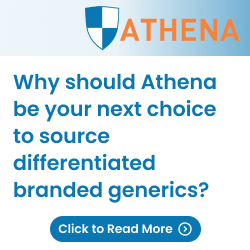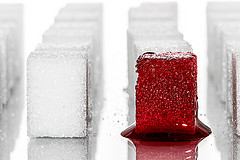This week, Phispers brings you news on the probable new head of the US FDA. Meanwhile, pharma biggies like Mylan, Endo, Eli Lilly, AstraZeneca and Sanofi have announced restructuring and layoffs, Switzerland’s Lonza has announced plans to buy Capsugel and Perrigo plans to offload its API plant in India to Strides Shasun. And there is more, read on.
Trump likely to pick venture capitalist Scott Gottlieb to head FDA
America’s President-elect Donald Trump is considering Scott Gottlieb, a partner at one of the world's largest venture
capital funds and a former deputy commissioner at the US Food and Drug
Administration (FDA), to run the government healthcare agency.
News comes days after Jim O’Neill — managing director at Mithril Capital Management, a venture capital firm run by Peter Thiel (the billionaire Trump donor and transition team advisor) — was said to be considered for the FDA top-job.
According to Michael Gaba, federal policy leader of law firm Holland & Knight’s national healthcare
and life sciences team, Gottlieb is a more “palatable” choice, as opposed to O’Neill, who believes that drugs should be allowed on the market before their efficacy has been established, as long as they are safe.
Because if O’Neill heads the FDA, neither the doctor nor the drug maker would have a clue whether the medicine will actually work or not, because the
government never required it to be tested.
Gaba is of the view that the drug industry too is likely to oppose O’Neill’s stance, since companies want to be able to make credible claims about their products, and that they are indeed effective in treating the ailments they claim to treat.
Layoffs at Sanofi, Lilly, Mylan, AstraZeneca and Endo
Over the last week, five pharmaceutical biggies that together account for a market cap of US $ 228 billion in the US bourses — Mylan, Endo Pharmaceuticals, Eli Lilly, AstraZeneca and
Sanofi — have announced major restructuring and layoffs.
The decisions of these companies are driven by a number of factors
ranging from failures in clinical trials to feeling the need to squeeze off
dead weight in the face of wilting sales.
There was some good news for Endo — its Par Pharmaceutical unit launched the first copycat of Merck’s cholestrol-fighting drug Zetia. Endo’s Zetia is
the only copycat for six months under FDA exclusivity rules. Though Merck’s Zetia sales (pegged at US $ 2.5 billion in 2015) is likely to suffer from this copycat drug, the company will face the biggest declines in Zetia sales after that 180-day monopoly ends next year. That’s when multiple generics players are likely to jump in the fray.
For Endo, the Zetia generic presents an opportunity to recoup sales as it struggles to redefine itself. Endo’s generic launch comes just after it cut 375 staffers and pulled the plug on a pain med project. Endo bought Par Pharmaceutical last year for US $ 8 billion. Par will share profits for the generic with its licensing partner — India-based Glenmark Pharmaceuticals.
Eli Lilly also had some good news — in the coming weeks, two leading US medical societies are poised to issue new diabetes treatment guidelines reflecting the lifesaving cardiovascular effects of Eli Lilly's Jardiance. This is likely to push up Jardiance sales.
Swiss drugmaker Lonza in talks to buy Capsugel for around US $ 5 billion
In a statement, Lonza Group AG, the Swiss pharmaceutical manufacturer, said it is in advanced talks with private equity firm KKR & Co LP to acquire
Capsugel, an American manufacturer of capsule products and other drug delivery
systems.
The potential transaction, according to
sources quoted in a Reuters news report, is likely to be valued at more
than US $ 5 billion.
Capsugel “would fit perfectly with Lonza’s ... strategy and strengthen its position as leading supplier to a number of important healthcare markets,” Lonza said in a statement. “A successful acquisition would be value adding and be within Lonza's stated acquisition criteria,” it added.
Under pressure to shore up finances, Perrigo offloads API plant to
Strides
Perrigo is offloading the FDA-approved API plant in Ambernath, Maharashtra, for a consideration
of US $ 14.8 million (INR 1,000 million) to India’s Strides Shasun. Perrigo has been under pressure from investors to shore up its
finances.
On its part, Strides has been shoring up its API business, following its merger with Shasun Pharmaceutical Ltd in 2014. After the acquisition, Strides will continue to produce some of Perrigo’s products at the plant under a long-term agreement. The deal is expected to close by the end of the year.
With this acquisition, Strides will get a plant that had sales of about US $ 10.9 million for the fiscal year ended March 31, 2016. It went through its last FDA inspection without a Form 483.
Strides
intends to use the facility for captive consumption APIs and will move all of
its integrated drug master files (DMFs) for captive consumption to the Perrigo
plant, which has a potential capacity of 600 tons per year. Now, Sweden too wants to host London-based EMA post Brexit vote
After other European Union (EU) members — such as Spain, France and Poland — have shown keenness to become the future location of the London-based European Medicines Agency (EMA), the Swedish government last week launched a campaign to become the new host of the drug agency after Britain’s vote to leave the EU.
The tussle to host the 900-strong EMA is
likely to form a part of complex political horse-trading around Brexit. Italy,
Denmark and Ireland have also put themselves forward as hosts.
“With one of Europe’s top national medicines agencies, an excellent climate for research and life science as well as good conditions for an efficient relocation, Sweden is a good future home for the EMA,” Sweden’s healthcare minister Gabriel Wikstrom said in a statement.
Diabetes drug Pioglitazone may pose risk of bladder cancer, confirms FDA
The US FDA has said it still believes that pioglitazone (sold as Actos and other brands) — the type 2 diabetes drug — may pose an increased risk for bladder cancer
after updating its review of published research.
Research on pioglitazone has gone back and forth on this issue. Back in 2011, the FDA had added a warning about the increased risk for bladder cancer to the drug’s label based on interim results of a 10-year epidemiological study of patients with diabetes in the database of
Kaiser Permanente (KP) of Northern California.
The data suggested that bladder cancer risk rose as the dose and
treatment duration increased. The revised label advises clinicians not to
prescribe pioglitazone for patients with active bladder cancer and to exercise
caution while using it in patients with a history of the cancer.
Subsequent studies (one in 2014, another in 2015) rebutted the causal
link between pioglitazone and bladder cancer. The 2015 study, published in the Journal
of the American Medical Association, looked at the full 10 years of data
drawn from the KP database but could no longer find the cancer signal detected
in the interim results.
However, a retrospective cohort study published earlier this year reported a 63
percent higher risk for bladder cancer for pioglitazone, with longer duration
and larger doses increasing the risk.
Impressions: 2503
This week, Phispers brings you news on J&J’s plans to acquire Actelion and Teva’s new medical cannabis inhaler due for launch in Israel. There are pharma deals from across the globe, such as Roche’s decision to sell its South Carolina plant and Catalent’s acquisition of Accucaps.M&A Compass: Roche sells API plant; Catalent laps up
Accucaps; Teva
announces layoffsSwiss drug maker Roche is selling its
active pharmaceutical ingredients (API) plant in South Carolina (US) to Patheon NV, a
leading global provider of high-quality drug development and delivery solutions
to the pharmaceutical and biopharma sectors. The deal will save 200 jobs in South Carolina. Patheon has also
entered into a multi-year supply arrangement with Roche. Meanwhile, Catalent, Inc has acquired Accucaps Industries Limited, a Canada-based developer and manufacturer of over-the-counter (OTC), high potency and conventional pharmaceutical softgels. The acquisition is subject to approval by the Canadian government. It will substantially complement Catalent’s global OTC and prescription pharmaceutical softgel capabilities and capacity.While Patheon and Catalent are making acquisitions, Teva
announced layoffs, and Pfizer cancelled its expansion plans in Ireland. Two
ministers of Malta announced that Teva
Pharmaceutical Industries will be laying off over 200 workers before the end of 2017.
Earlier this year, Teva had acquired Actavis Generics and recently informed the government of its decision to start “consolidating production” around its 30 plants in Europe and that it would also lay off workers in Malta.Meanwhile, Pfizer has cancelled a planned US $ 425 million
expansion of its Grange Castle plant in Dublin, a development which would have
led to permanent employment for 350 people and 1,250 jobs during construction.Pfizer is one of Ireland’s largest private sector employers. It had sought permission earlier this year for a major extension to the plant. However, the plans have been shelved due to failure of a high-profile, late-stage pipeline drug to lower cholesterol.Teva to market medical
cannabis inhaler in Israel
For the first time, the medical cannabis sector managed to comply with the pharmaceutical standards for inhalation. Israel’s Teva Pharmaceuticals has partnered with Tel Aviv-based Syqe Medical to market medical cannabis in Israel for pain management. The dose is administered with the help of an inhaler — the most efficient means of administering cannabis.Teva will be the exclusive marketer and distributor of the inhaler in Israel. The inhaler, which is pending approval from Israel’s ministry of health, will be available for home use.J&J approaches Actelion for acquisition; Actelion says no
guarantee of the deal
Last week, Switzerland’s leading biopharmaceutical company — Actelion Ltd — confirmed that it has been approached by the US healthcare titan Johnson & Johnson for a possible takeover. Actelion is focused on the
discovery, development and commercialization of innovative drugs, and is a
leader in the field of pulmonary arterial hypertension (PAH).However, Actelion said there is no guarantee of the deal. Actelion chief executive Jean-Paul Clozel desires
to keep the company independent after building it from scratch. And news
reports say J&J will have to pay a steep premium if a takeover is to
succeed.Actelion's rare-disease focus makes it an attractive target,
since its drugs face less price pressure than other more widely used medicines.
There are other reasons why the takeover looks improbable. First, Actelion’s market capitalization far outstrips its net present value. Second, President-elect Donald Trump’s proposed repatriation holiday may come in the way of J&J making the acquisition.Drugs in India fail quality standards; Vietnam bans major
Indian manufacturersThis was a bad week for Indian pharma. Drug regulators of seven
Indian states alleged that 27 medicines — sold by 18 major drug companies — are of “substandard” quality. These were cited with false labelling, wrong quantity of ingredients, discoloration, moisture formation, failing dissolution test and failing disintegration test.The tests on the 27 medicines were done by drug regulators of
Maharashtra, Karnataka, West Bengal, Goa, Gujarat, Kerala and Andhra Pradesh.
The drug makers include Abbott India, GSK India, Sun Pharma, Cipla and Glenmark Pharma, Alkem Labs, Cadila Healthcare, Emcure Pharma, Hetero Labs, Morepen Labs, Macleods Pharma, Wockhardt Pharma and Zydus Healthcare.The drug brands alleged to be substandard are: antipsychotic drug
Stemetil
and antibiotic drug Pentids
from Abbott India, anti-bacterial medicine Althrocin
by Alembic Pharma, migraine medication Vasograin by Cadila Pharma, cough syrup Ascoril by Glenmark Pharma, worm infection drug Zentel
by GSK India, arthritis medication Hydroxychloroquine
(HCQS) by Ipca Labs, anti-inflammatory medication Myoril
by Sanofi Synthelabo, and Torrent Pharma’s hypertension drug Dilzem.In Parliament, the minister of state for health said that drugs,
which are banned in other countries, have been allowed to be sold in India subject to
certain provisions. The drugs which have been allowed in India are nimesulide, analgin and pioglitazone. What was worse, Vietnam blacklisted 39 Indian drug companies,
including Aurobindo Pharma, Cadila and Macleods Pharmaceuticals for
quality standard violations. The Vietnamese drug regulator has also banned
companies in Bangladesh and South Korea. The regulator has listed the names of
blacklisted companies on its website.FDA’s quality metrics programme to be voluntary till 2018Last week, the US Food and Drug Administration (FDA) released a revised version of its proposal to
collect quality metrics data from drug manufacturers in response to protests
from the industry.As per the revised draft, the program will begin with a voluntary
phase that will run into 2018, after which the FDA intends to make the program mandatory.The revised draft guidance also narrows the scope of the program by
cutting the number of metrics the agency plans to ask for. It also grants more
flexibility with quality metrics to drug companies that are reporting by both
product and site."The revised draft guidance includes the following changes
from the earlier draft guidance: Adoption of a phased-in (voluntary) approach,
reduction in the number of data elements requested (i.e., reduction in
reporting burden), support for both product reports and site reports,
modifications to the quality metrics data definitions, addition of clarifying
examples for the definitions, addition of comment fields, and clarification of
special considerations for non-application and OTC (over-the-counter) product
reporting," the FDA said.EMA publishes results of two more clinical studiesThe European Medicines Agency (EMA) has published clinical data for two more medicines — Armisarte and Caspofungin — on its clinical data website. The clinical data website was launched on October 20, 2016, when the EMA had added clinical data for Kyprolis
and Zurampic.
The website is in line with the EMA’s policy on the publication of clinical data.Armisarte,
a hybrid product (a product that is similar to its reference product but is
available in a different pharmaceutical form), is indicated for the treatment
of malignant pleural mesothelioma lung cancer and advanced non-small-cell lung
cancer.Caspofungin Accord, a generic product, is indicated for the
treatment of invasive candidiasis, invasive aspergillosis and other fungal
infections when the patient is febrile and neutropenic.Pharmaceuticals most counterfeited category, says reportA new report cites pharmaceuticals as the most targeted category for
counterfeiting. Globalization and the booming use of the internet is giving a
boost to counterfeiting.The report has been launched by online brand protection firm, NetNames. Titled The Risks of
the Online Counterfeit Community, the report looks at online
counterfeiting. It warns that no brand can afford to underestimate the
sophistication of fraudsters in the digital world.The size of the counterfeit market for pharmaceuticals is
estimated at US $ 200 billion, followed by electronics (US $ 169 billion) and
food (US $ 49 billion). According to NetNames, one in six products bought online is fake. And one-third
of all counterfeit seizures in the EU are linked to internet distribution
channels.According to NetNames, there are up to 50,000 internet pharmacies
in operation. Around 95 per cent of
these do not comply with laws and industry standards. Meanwhile, 90 per cent of
drugs purchased online come from a different country than what the website
claims. According to the report, the internet provides counterfeiters
with anonymity, virtually no barriers to entry, low overheads, easier
distribution with more frequent, smaller consignments sent by mail, and fewer
risks of being caught. And the desire by consumers to seek out big brands
online at discount prices, is providing counterfeiters with a ready target
audience and the opportunity to further the fraudsters' reach and potential
profitability.Trump announces Tom Price as health secretaryThis week, America’s President-elect Donald Trump announced Republican US Representative Tom Price as his Health and Human Services
Secretary. Price is an orthopedic surgeon from Georgia.Seema Verma, the founder of a health policy consulting company,
will lead the Centres for Medicare and Medicaid Services, which is part of
Health and Human Services (HHS).Meanwhile, Trump is expected to name Steven Mnuchin, a former Goldman Sachs partner and Hollywood financier, as his nominee for the post of Treasury Secretary. Mnuchin, who spent 17 years at Goldman Sachs before leaving in 2002 to launch a hedge fund, served as Trump's campaign finance chairman. Billionaire investor Wilbur Ross, known for his investments in distressed industries, is expected to be named Commerce Secretary.
Impressions: 3292
Over
700 commonly used generic medicines were
recommended for suspension by the European Medicines Agency (EMA) based on data
integrity concerns, over clinical studies conducted at GVK Biosciences in
Hyderabad, India.What
will be the global fallout of the European decision? The European decision has
impacted products from companies such as:Abbott Laboratories, Accord Healthcare (Intas), Actavis, Alembic, Apotex, Betapharm (Dr. Reddy’s), Brown & Burk UK, Fair Med Healthcare AG, Glenmark, Lupin, Micro Labs, Mylan, Orion Corporation, Ranbaxy, Ratiopharm, Sandoz, Sanofi-Aventis, Stada, Teva, Torrent, Wockhardt, Zydus… and many, many more.The
original recommendation of suspending
some of the medicines
made in January 2015, was an outcome of an inspection of GVK Biosciences’ site in Hyderabad (GVK BIO is a Clinical Research Organization-
CRO) by the
French medicines agency (ANSM) through the EMA. The EMA stated in their official release: “The
inspection revealed data manipulations of electrocardiograms (ECGs) during the
conduct of some studies of generic medicines, which appeared to have taken
place over a period of at least five years. Their systematic nature, the
extended period of time during which they took place and the number of members
of staff involved cast doubt on the integrity of the conduct of trials at the
site.” 1000 drugs reviewed// 700
rejectedWhile
over 1,000 pharmaceutical forms and strengths were reviewed at the GVK site,
over 300 of them had sufficient supporting data available from other sources.
As a result, these medicines were allowed to remain on the market in the EU.However, for the over 700 other medicines, the EMA after its second review, maintained its previous recommendation of January 2015, to suspend medicines, where no additional supporting data from other studies was available. Only one exception after that second review was spared from suspension, as the company was able to address the EMA’s concerns: it was Bivolet Nebivolol (5 mg tablets/ marketing authorisation holder: Neo Balkanika EOOD).While the agency noted that “there is no evidence of harm or
lack of effectiveness linked to the conduct of studies by GVK Biosciences at
Hyderabad. Some of these medicines may remain on the market” if they are of critical importance for patients. However, the recommendation
will now be sent to the European Commission for a legally binding decision,
which will apply to Member States regardless of the decision taken in the
interim period.The updated list of medicines for which, the CHMP (Committee
for Medicinal Products for Human Use) recommends suspension, is available on the EMA website. Companies
are given 12 months to submit additional data. The potential global impact of the European
suspensions?The GVK Biosciences
scandal is almost as severe in magnitude and impact, as the data falsification
concerns, which were discovered at Ranbaxy (Katherine Eban’s stunning investigation in Fortune, “Dirty Medicine” covers this extensively). One of the main promoters of GVK Biosciences is Mr. D.S. Brar who was CEO & Managing Director of Ranbaxy from 1999-2004. The impact of GVK
Biosciences’ misdeeds is already being felt on new product launches. Mylan recently withdrew its European application for generic
Abilify (aripiprazole) (2014 sales US$6.2x billion) citing “identification of major GCP issues (Good
Clinical Practices).” What about the impact on the US market?In 2010, FDA discovered data integrity
violations, which bankrupted
clinical research organization, Cetero Research/PRACS. Based on the Cetero findings
in the United States, the EMA suspended seven drugs. Now it remains to
be seen, how the FDA will handle the data integrity concerns found in Europe
since products like repaglinide & candesartan cilexitil (Mylan), levetiracetam (Dr. Reddy’s), clonazepam (Sandoz), metformin hydrochloride (Actavis), tacrolimus (Panacea Biotech) all have U.S. FDA approvals. Leading GVK Biosciences’ defense is the Indian government, who warned last month that if the European Union does not reconsider their decision, it may go to the World Trade Organization. The Indian government’s position is based on an appeal by GVK Biosciences, which made the “Indian government set up a panel of experts last year to investigate
the matter and found no manipulation”, GVK Biosciences CEO Manni Kantipudi told Reuters.However, globally reputed GMP expert, Lachman Consultants, believes that the GVK Bioscience episode “could potentially impact data integrity, similar to the Cetero/PRACS
case”.It’s clear for us that this is not the end of the story…
Impressions: 4094
Diabetes: Which New Drug is the Safest? FDA Issues Safety Warning on oral Antidiabetic Blockbusters.
Recently launched type 2 diabetes molecules, canagliflozin, dapagliflozin, and empagliflozin, were
served a deadly blow as the FDA recently issued a safety warning regarding their use, leading to a potential life-threatening condition. As almost all diabetes products have some side effect or
the other, we are wondering, which
next generation diabetes drug is the safest?
The recent warning of the U.S. Food and Drug Administration (FDA) says that: “type 2 diabetes medicines canagliflozin, dapagliflozin, and
empagliflozin may lead to ketoacidosis, a
serious condition, where the body produces high levels of blood acids called
ketones, that may require hospitalization”.
The FDA warning
is a severe setback as it limits the options available to reduce
blood sugar without the need for needles.
Ketoacidosis, typically affects type 1 diabetes
patients, but patients using these new molecules were type 2 diabetes and have
developed ketoacidosis. All of the cases highlighted by the FDA involved people
with type 2 diabetes, even if the
condition manifested itself slightly differently than in patients with type 1 diabetes.
These
drugs, are also known as SLGT2 inhibitors. They have been on track for
blockbuster sales and are sold under different brand names.
Table// Brand names for SLGT2 inhibitors (canagliflozin,
dapagliflozin, and empagliflozin):
Company Name
Single Ingredient
Fixed-dose Combination
Johnson & Johnson
Invokana® (canagliflozin)
Invokamet® (canagliflozin and metformin)
AstraZeneca
Farxiga® (dapagliflozin)
Xigduo XR® (dapagliflozin and metformin)
Boehringer
Jardiance® (empagliflozin)
Glyxambi® (empagliflozin and linagliptin)
Blockbuster sales:
Johnson & Johnson, the first to get approval for their SGLT2
inhibitor (canagliflozin) in the United States, reported in 2015 first quarter sales of $278
million, almost triple of their sales for the same period last year.
The quarter-on-quarter growth was almost 40%!
AstraZeneca, on the other hand, had to contend with a dapagliflozin
drug stock out in Canada “due to higher than anticipated demand”.
Actually, the overall sales estimates, for this
class of drugs, have been variable with some analysts believing the annual
sales will be US$2 billion, while others, expect them to reach US$5 billion.
Adverse side
effects:
Despite these success stories, SGLT2 inhibitors have had a bumpy ride in
the approval process with potential cancer risk,
leading to the rejection of the initial dapaglifloxin application by the FDA. This
category of molecules have also been
linked to increased rates of genital and
urinary tract infections, along with kidney damage and cardiovascular issues.
So who will benefit?
All this bad news on SGLT2 drugs could be positive for
another class of anti-diabetic molecules called DPP4 inhibitors.
Merck & Co’s Januvia® (sitagliptin) and Janumet® (sitagliptin and metformin) dominate this category of products with almost $6
billion in 2014 sales. In addition this year, Merck succeeded in demonstrating the cardiovascular safety of Januvia®, which was
not the case for other DPP4 inhibitors like AstraZeneca’s Onglyza® (saxagliptin)
and Takeda’s Nesina® (alogliptin).
While Merck’s Januvia has its own set of concerns (there have
been reports of acute pancreatitis), the risks compare
mildly when associated with other new anti-diabetes drugs.
For Takeda’s other diabetes drug, Actos® (pioglitazone), lawsuits related to cancer risks drove
the company to its first annual loss in six decades. They paid a settlement
of $2.4 billion last month.
While Actos® continues to remain on the market, safety concerns will impact the future sales of diabetes medicines, as they all battle one
of the biggest epidemics challenging public health.
Impressions: 4179
















